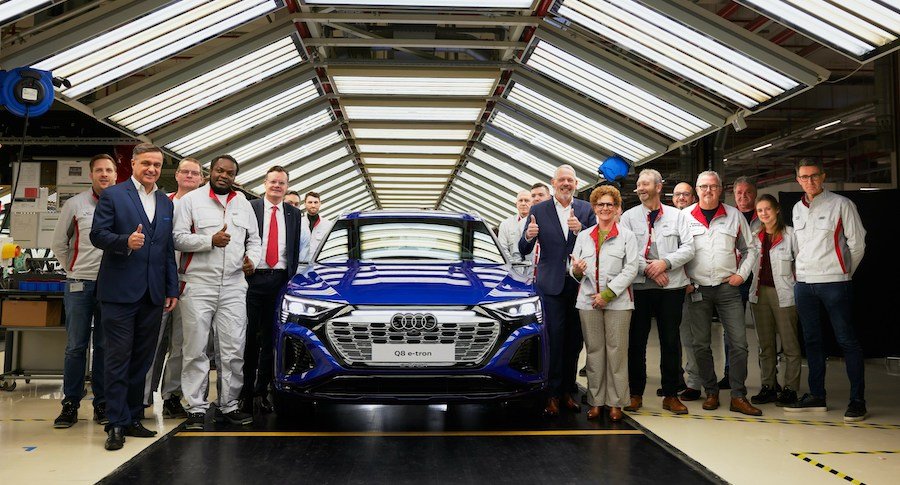Audi Q8 E-Tron And Q8 E-Tron Sportback Enter Production In Brussels

Audi has begun series production of the Q8 e-tron and Q8 e-tron Sportback at its plant in Brussels, Belgium on December 14.
Since 2018, the factory has built around 160,000 units of Audi's first production EV, the e-tron SUV. In 2021 alone, Audi Brussels made 43,866 all-electric e-tron and e-tron Sportback vehicles, which are the predecessors of the newly badged Q8 models.
Production is set increase significantly next year as the Audi Q4 e-tron will also be made at the plant from the second half of 2023 at a rate of about 70 units per day. The Q4 e-tron is currently made exclusively at the Volkswagen Group plant in Zwickau, Germany.
Until then, the facility will have time to ramp production of the Audi Q8 e-tron and Q8 e-tron Sportback, which are essentially the facelifted and renamed variants of the e-tron and e-tron Sportback.
"Brussels has done valuable pioneering work. We are learning from our experience of having delivered around 160,000 vehicles worldwide. As the next step, we will leverage this experience to ramp up battery production in Ingolstadt."
Gerd Walker, Audi board member for Production and Logistics
The battery assembly facility in Brussels is playing a groundbreaking role for the entire Audi Group, which includes the Audi, Bentley, Lamborghini, Ducati and Italdesign.
Audi says the Brussels facility is a model for sustainability and implementing the future of production at the company, the so-called "360factory." The site has been recognized as the world's first certified carbon-neutral high-volume production plant in the premium segment since production of the Audi e-tron began in 2018.
Powered by green electricity since 2012, Audi Brussels installed one of the region's largest photovoltaic systems on the plant premises, covering 107,000 square meters (26.44 acres). The system generates around 9,000 megawatt-hours of power from sustainable energy every year, enough to charge some 90,000 Audi Q8 e-tron vehicles and reduce carbon emissions by 1,881 tons.
Furthermore, the companies that supply the battery cells are required to use only renewable energy sources for production, while the electric traction motors are transported from Györ, Hungary to Brussels by green freight trains; this helps reduce carbon emissions by around 2,600 tons annually.
The Audi Q8 e-tron and Q8 e-tron Sportback offer increased efficiency, improved aerodynamics and higher charging performance and battery capacity. This results in an increased WLTP range of up to 582 kilometers (361 miles) in the SUV and up to 600 kilometers (373 miles) in the Sportback—when equipped with the larger 115-kWh battery pack (a 92-kWh pack is standard).
Both Audi Q8 e-tron batteries feature cells from Samsung SDI, whereas the original e-tron was powered by battery cells from LG. EPA range ratings haven't been announced yet, but they will probably top 300 miles with the big battery. The Audi Q8 e-tron, in both SUV and Sportback versions, is expected to reach US dealerships in mid-2023.
Related News
